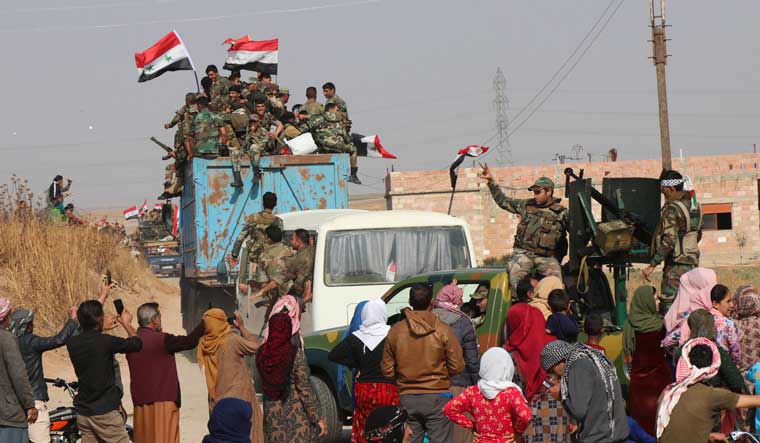Turkey warns Kurds: ‘Any attempt to divide the country will trigger military intervention’
 Syrian government forces reinforcements arrive near the city of Ras al-Ain | AP
Syrian government forces reinforcements arrive near the city of Ras al-Ain | AP
Turkish Foreign Minister Hakan Fidan warned Kurdish groups and other factions in Syria against pursuing autonomy, declaring that any attempt to divide the country would be seen as a direct threat to Turkey’s national security. He said such efforts could prompt military intervention by Ankara.
Speaking at a joint press conference with his Salvadoran counterpart in Ankara on July 22, Fidan reiterated Turkey’s opposition to any form of separatism in Syria, while expressing support for Syria’s new interim government, led by President Ahmad al-Sharaa. “If you go beyond integration and use violence to divide and destabilise, we will perceive it as a direct threat to our national security and intervene,” he said.
Fidan’s remarks came amid a fresh wave of violence in southern Syria, where clashes between Bedouin Arab tribes and Druze militias have led to Israeli airstrikes on government positions. Israeli forces struck convoys in Sweida province and targeted the Ministry of Defence in Damascus, claiming the attacks were intended to protect the Druze community.
The Turkish foreign minister criticised Israel’s involvement, calling the strikes an attempt to destabilise Syria and derail its recovery. He accused Israel of seeking to fragment Syria for strategic gain and warned that Kurdish groups, particularly the YPG (People's Protection Units), were trying to exploit the unrest for autonomy. “Trying to extract autonomy or independence from chaos built on blood and created with someone else’s help is a perspective that leads nowhere,” he said.
Fidan reiterated Turkey’s support for the agreement between Syria’s interim administration and the Kurdish-led Syrian Democratic Forces (SDF) to integrate the group into the national army. He said Ankara welcomed cultural and religious diversity within a unified Syria, but drew a red line at any effort towards independence. “Say whatever you want, make whatever demands you have – as long as it’s not about division, we’re ready to help. But if you cross that line, we won’t leave ourselves exposed to threats,” he added.
Since 2016, Turkey has launched several military operations in northern Syria to contain Kurdish fighters and prevent what it considers the establishment of a terror corridor along its border. Ankara views the YPG, which leads the SDF and is backed by the United States, as an extension of the outlawed PKK (Kurdistan Workers Party).
Meanwhile, Syria’s fragile recovery continues to be threatened by renewed sectarian violence. A government-appointed inquiry committee reported on July 22 that more than 1,400 people were killed in several days of violence along the coastal region this year. The unrest followed the ouster of former president Bashar al-Assad in December. The committee said there was no evidence that Syria’s new leadership ordered attacks on Alawite communities, Assad’s sectarian base, but that 300 suspects had been identified for serious crimes, including murder and looting. Of them, 37 were arrested. Authorities did not confirm whether any of the suspects were members of the security forces.
The conflict in Sweida, where Druze militias clashed with Bedouin tribes, also threatens to derail the country’s transition. The fighting reportedly ended with a ceasefire announced by the United States on July 19, following mediation efforts involving Washington, Turkey and Israel.
Saudi broadcaster Al-Hadath reported on July 22 that Israel and Syria had resumed dialogue on security matters, with Turkey and the US playing intermediary roles. An Israeli delegation is expected to travel to Baku, Azerbaijan, to finalise understandings with Syrian representatives. The talks are said to focus on establishing a demilitarised zone along the border and allowing a permanent Israeli presence in the buffer zone created after Assad’s fall.
However, reports also indicate that Israel has not committed to ending its strikes in Syria. Axios reported on July 21 that US special envoy to Syria Tom Barrack would lead a meeting between Israeli and Syrian officials on later this week. The discussions are expected to cover security coordination and prevent further destabilisation in southern Syria.
Barrack, who also serves as US ambassador to Turkey, has criticised Israel’s recent military actions, warning they risk undermining the interim Syrian government supported by Washington. Speaking to reporters, he said the atrocities in Sweida were not carried out by regime troops. “They’re not even in the city because they agreed with Israel that they would not go in,” he said. Barrack urged Israel to engage in dialogue and allow the US to act as a mediator.
White House press secretary Karoline Leavitt said on July 21 that President Trump was “caught off guard” by the Israeli airstrikes, which several US officials viewed as jeopardising efforts to stabilise Syria under its new leadership.
Fidan concluded his remarks by urging all factions in Syria to choose integration over division. “Now is the time for unity,” he said. “It’s time for everyone to hold onto life while preserving their identity and beliefs.”
Middle East